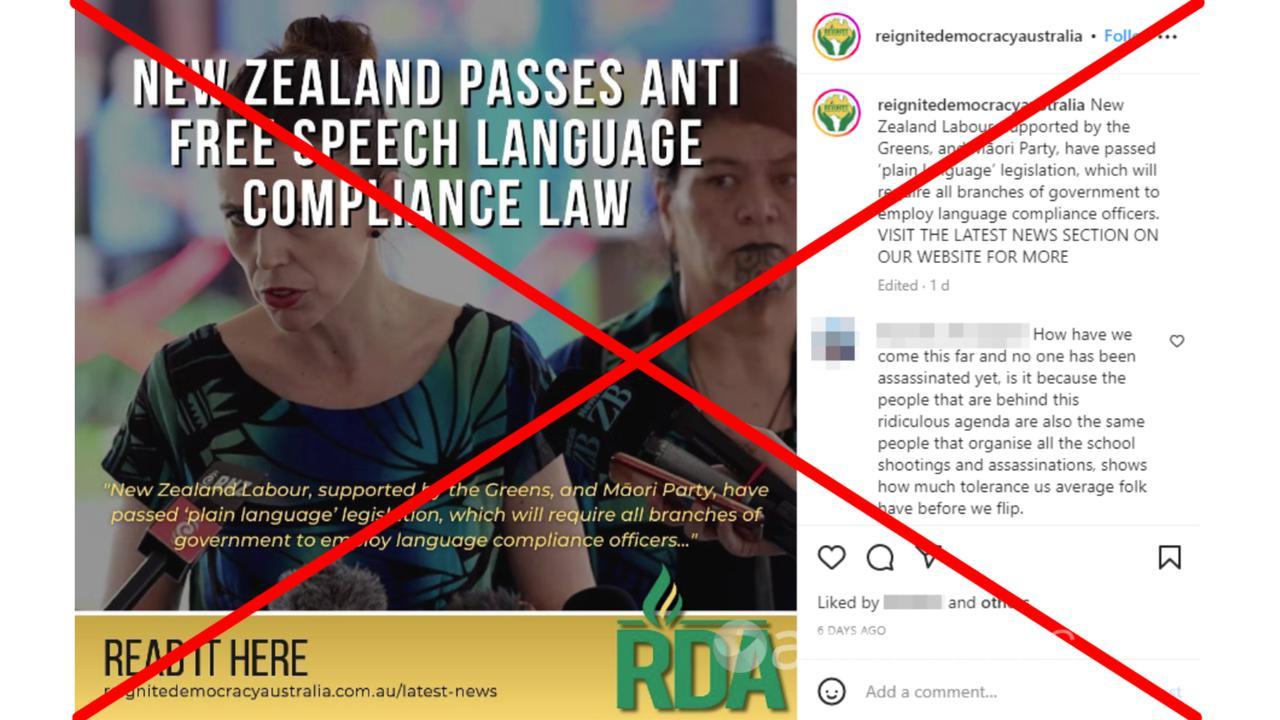An Instagram post claims the New Zealand government has passed an anti-free speech language compliance law.
This claim is misleading. Experts told AAP FactCheck the Plain Language Act does not impose on the right to free expression. It simply requires the government and public service agencies to use normal language rather than bureaucratic jargon.
The post (archived here), made by individual rights group Reignite Democracy Australia on October 29, features an image of Prime Minister Jacinda Ardern overlaid with the headline “NEW ZEALAND PASSES ANTI FREE SPEECH LANGUAGE COMPLIANCE LAW”.
Text with the post reads: “New Zealand Labour, supported by the Greens, and Maori Party, have passed ‘plain language’ legislation, which will require all branches of government to employ language compliance officers.”
The caption then directs readers to the “latest news section on our website for more”. The corresponding page features an article originally published by The Spectator Australia.

While the caption is correct in stating the law requires government and public service agencies to employ compliance officers, the headline is misleading in claiming it is “anti free speech”.
“I will never comply. Is that free enough for you. It’s our God given right,” one comment beneath the post reads. Another comment reads: “How does this … pass? Freedom of opinion and speech is a our constitutional right.”
“Political opponents will soon be criminals for speaking against the party in power,” another claims.
Linguistic experts and media hailed the law after NZ’s parliament approved it in October 2022 (see here, here, and here).
Janine Hayward, an expert on New Zealand government and politics at University of Otago, told AAP FactCheck “the Bill does not inhibit free speech in any way”.
“It does not restrict what a Bill can say. Rather, it ensures that the meaning of a Bill is written in plain language that more people can understand,” Professor Hayward said in an email.
Paul Rishworth, an expert on human rights laws at the University of Auckland and a member of the New Zealand Legislation Design and Advisory Committee, said in an email the law required only the government and public service agencies “to use plain language” and “does not impose any obligations on private persons”.
Section 3 of the Act outlines its purpose to improve the accessibility of government and public service documents by using language that is “appropriate … clear, concise, and well organised”.
John Ip, an expert in public and constitutional law at the University of Auckland, also told AAP FactCheck the legislation does not suppress freedom of speech.
“The traditional rationale of the protection of freedom of expression was to protect dissenting and unpopular voices from state suppression,” Associate Professor Ip said in an email.
“This Act applies to the public sector or government, loosely speaking. It requires the public sector to take reasonable steps to ensure public-facing documents are not written in bureaucrat-eese.”

Mr Ip noted the Act does not create legal rights or obligations that are enforceable in court.
As such, plain language officers are responsible for educating agency employees and ensuring they comply with the law but the consequences of non-compliance are unclear, Mr Ip says.
“So, unless one is willing to say that a law that requires the public sector to try to write in an accessible way – the Act says nothing about the content of what is written – violates the right to free expression, it is hard to take the free expression argument seriously,” he said.
Another fact check on a claim Ms Ardern allegedly wanted to censor free speech was found to be misleading.
AAP FactCheck has previously addressed other claims from Reignite Democracy Australia (see here), as well as debunking another claim on free speech in New Zealand.
The Verdict
The claim the New Zealand government has passed an anti-free speech law is misleading. Experts told AAP FactCheck the Plain Language Act requires the government and public service agencies to use language which is easy to understand. It does not apply to the general public and only aims to remove jargon from government documents.
Misleading – The claim is accurate in parts but information has also been presented incorrectly, out of context or omitted.
* AAP FactCheck is an accredited member of the International Fact-Checking Network. To keep up with our latest fact checks, follow us on Facebook, Twitter and Instagram.
All information, text and images included on the AAP Websites is for personal use only and may not be re-written, copied, re-sold or re-distributed, framed, linked, shared onto social media or otherwise used whether for compensation of any kind or not, unless you have the prior written permission of AAP. For more information, please refer to our standard terms and conditions.


















